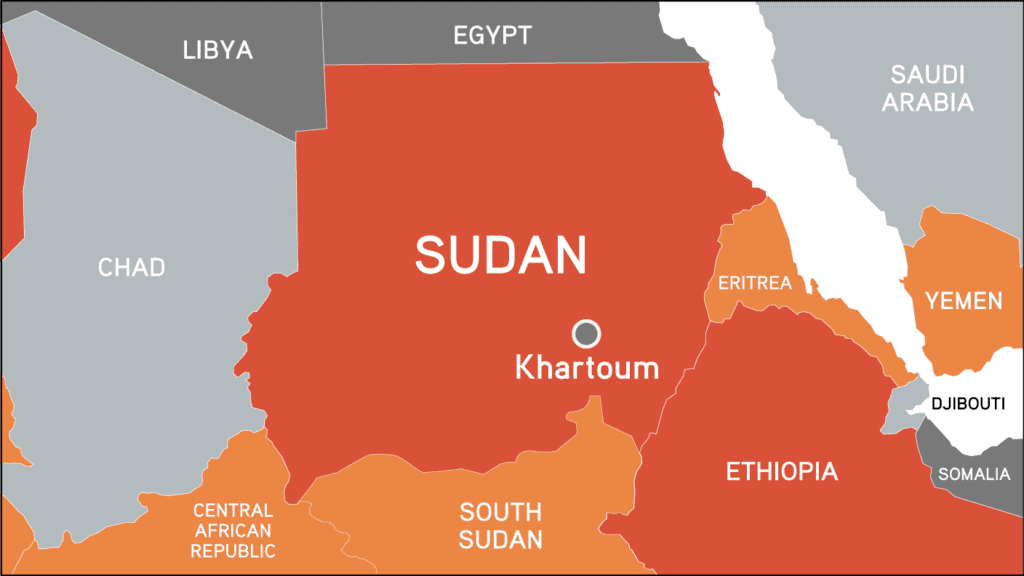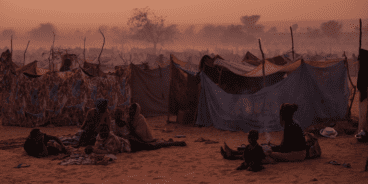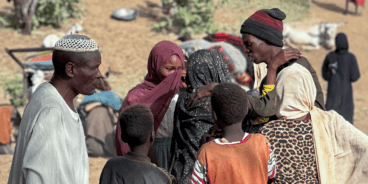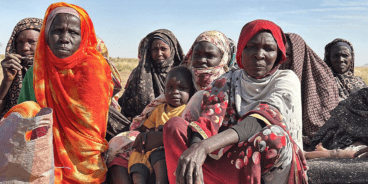Sudan

Populations in Sudan are enduring war crimes and crimes against humanity due to an armed confrontation between the Sudanese military, the paramilitary Rapid Support Forces (RSF) and allied militias. Non-Arab communities in Darfur are enduring crimes that may amount to acts of genocide as result of ethnically motivated killings by the RSF.
BACKGROUND:
Since violent clashes broke out on 15 April 2023 between the Sudanese Armed Forces (SAF) and the paramilitary Rapid Support Forces (RSF), both parties have engaged in a fight to preserve and expand control. The conflict has been characterized by indiscriminate and deliberate attacks against civilians and civilian objects, often with rocket shells, bombardments and heavy artillery, including in densely populated areas, and the widespread use of sexual violence, including rape, sexual assault, exploitation and sexual slavery. The UN Human Rights Council-mandated Fact-Finding Mission has concluded that the SAF and RSF, and their allied militias, are responsible for large-scale violations of human rights and International Humanitarian Law (IHL), many of which amount to war crimes and/or crimes against humanity. As of September 2024, the World Health Organization reported that the conflict claimed over 20,000 lives, though this figure is likely an underestimate.
The RSF have utilized the conflict to accelerate a systematic campaign of ethnic cleansing and large-scale attacks targeting non-Arab communities in Darfur and other regions, with possible acts of genocide. RSF forces have expanded their control over almost all of Darfur, and dozens of cities, towns and villages have been fully or partially destroyed. The UN Security Council (UNSC)-mandated Panel of Experts estimates that the RSF and allied militia killed between 10,000 and 15,000 civilians in El Geneina from April to June 2023 alone. El Fasher, the capital of North Darfur, remains the only area not under the control of the RSF. However, the city has been besieged for nearly a year, significantly increasing the risk of further mass atrocities.
The ongoing conflict has severely restricted access to lifesaving aid and essential services due to targeted attacks and looting of humanitarian supplies. The conflict has triggered the world’s largest hunger crisis, with 25.6 million people facing acute hunger. During August 2024 the Integrated Food Security Phase Classification Famine Review Committee determined that famine is ongoing in the Zamzam displacement camp in North Darfur, with similar conditions likely present in other sites around El Fasher. The UN Office for the Coordination of Humanitarian Affairs (OCHA) reports that over 11.6 million people are currently displaced, including 3.3 million who have fled to neighboring countries.
Sudan underwent multiple significant political changes after former President Omar al-Bashir was overthrown amidst country-wide protests in 2019. Leadership was initially handed over to a joint civilian-military transitional Sovereign Council until the military – under the leadership of General Abdel Fattah al-Burhan and supported by Mohamed Hamdan “Hemedti” Dagalo – seized power on 25 October 2021. The latest conflict was sparked by mounting tensions between General Burhan, commander of the SAF, and General Hemedti, commander of the RSF, regarding the integration of the RSF into Sudan’s regular forces as part of a political agreement aiming to establish a new transitional civilian authority.
RECENT DEVELOPMENTS:
Violence against civilians and civilian infrastructure has escalated, as the SAF and RSF intensify their fight for control over key areas, including the capital, Khartoum. In early January the SAF and allied armed groups launched an offensive in Wad Madani, aiming to expel the RSF from the strategically important capital city of Al Jazeera State. During the operation, the SAF allegedly targeted civilians based on their ethnicity. Scores of civilians were also killed in other regions between 30 January and 1 February, including Al Obeid and Um Rawaba in North Kordofan State. On 1 February the RSF launched a deadly attack on the open Sabreen Market and several residential neighborhoods in Omdurman, Khartoum State, killing at least 60 civilians and injuring 150 others. On 6 February OCHA reported that South Kordofan and Blue Nile states are on the brink of catastrophe as violence escalates at an alarming rate. Artillery fire on Kadugli, the capital city of South Kordofan controlled by the SAF, has reportedly killed at least 80 civilians.
Between 21 and 25 January the RSF carried out its largest attack to date in El Fasher against the SAF and allied forces. On 26 January a drone strike, allegedly carried out by the RSF, targeted the last functioning hospital in El Fasher, killing at least 70 people and further crippling access to medical care in the region. On 11 and 12 February the RSF reportedly attacked Zamzam camp’s eastern side with heavy weapons, shelling and small arms, setting fire to the main market and homes while looting and destroying property.
On 8 November 2024 the UNSC sanctioned two RSF commanders for the first time since the conflict’s outbreak. However, that same day Russia vetoed a proposed resolution to advance civilian protection measures. During January 2025 the United States imposed sanctions on General Burhan and General Hemedti and concluded that members of the RSF and allied militias have committed genocide in Sudan.
ANALYSIS:
General Burhan and General Hemedti have consistently obstructed Sudan’s political transition to preserve and expand their power and privileges. Both continue to recruit forces along ethnic lines and strengthen relationships with regional powers, including several Gulf states.
While a ceasefire between the SAF and RSF is vital, it will not end the RSF’s ongoing identity-based violence. For decades, the Arab-dominated government imposed its control on ethnic minorities and exploited ethnic divisions, with armed Arab militias like the Janjaweed (the RSF’s forerunner) fueling deadly competition for resources and pastoral land. Civilians in Darfur, particularly non-Arab communities, are at risk of ethnic cleansing and genocide given the region’s genocidal history, entrenched impunity for past crimes and ongoing ethnically charged violence, particularly those affected by the current violence in El Fasher.
Impunity has allowed those responsible for atrocity crimes and grave human rights violations to remain in leadership positions. During his dictatorship, former President Bashir, government officials and militia leaders were allegedly responsible for crimes against humanity, war crimes and acts of genocide, for which they were indicted by the International Criminal Court following a 2005 UNSC referral. As a commander of the Janjaweed, General Hemedti was also implicated in atrocities committed during the conflict in Darfur and beyond.
RISK ASSESSMENT:
-
- Humanitarian and human rights crisis caused by armed confrontation, including in densely populated areas.
- Deliberate targeting of civilians based on their ethnicity, which may amount to ethnic cleansing and genocide.
- Past or present serious discriminatory practices, policies or legislation against marginalized communities and persons belonging to minority groups, some of which may amount to crimes against humanity and acts of genocide.
- Absence of reconciliation or transitional justice processes following decades of conflict and atrocities.
- Provision of arms, financial, logistical, training or other forms of support by external actors, including states, private companies and other actors.
NECESSARY ACTION:
Generals Burhan and Hemedti must agree to a permanent cessation of hostilities and all forces under their command must adhere to International Human Rights Law and IHL. The international community, including the UNSC, African Union and UN member states, must use diplomatic channels, far-reaching sanctions and public condemnation to pressure the SAF, RSF and allied militias to immediately cease hostilities. The UNSC must urgently consider adopting a strong resolution with effective measures to protect civilians and prevent further escalation, including expanding the sanctions regime to target those responsible for conflict-related sexual violence, ethnic-based attacks and other atrocities. In addition to ceasefire negotiations, the international community must assess the risk of further atrocities, including evaluating which communities are at imminent risk, and determine appropriate response.
It is essential that humanitarian organizations are allowed safe and unhindered access. International donors must utilize more innovative ways of delivering aid to vulnerable populations across Sudan, including by supporting civilian-run Emergency Response Rooms and neighborhood communities and disbursing cash grants.
Atrocity Alert No. 434: Sudan, Ethiopia and the UN Human Rights Council
Related Content

Twenty years of the Responsibility to Protect and the unfulfilled promise in Darfur

Atrocity Alert No. 435: Sudan, Israel and the Occupied Palestinian Territory and Democratic Republic of the Congo
